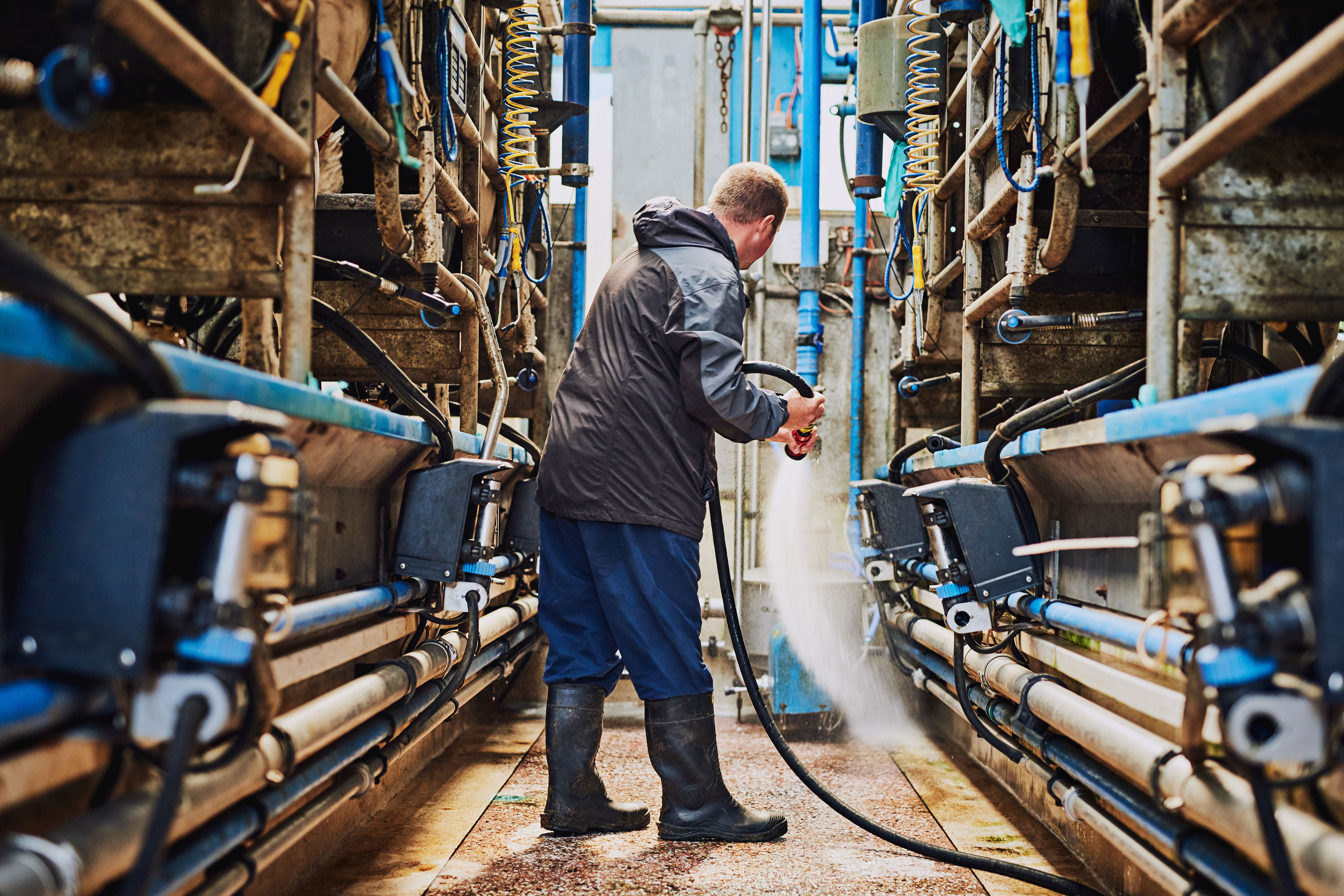Biosecurity: How to Protect Your Farm and Prevent Disease
Posted on: 17/12/2024, 00:00

Biosecurity is a critical aspect of modern farming, protecting livestock, livelihoods, and the environment from harmful diseases. With risks ranging from contaminated equipment to visitors and wildlife, farmers must take proactive measures to reduce the spread of infection. In this article, we'll explore what biosecurity is, why it matters, and the key steps you can take to safeguard your farm. From practical cleaning tips to essential supplies like disinfectants and pressure washers, discover how to maintain a safe, compliant, and disease-free environment for your animals and workers. Let's dive in!
What is Biosecurity?
Biosecurity might sound like a complicated term, but at its core, it's all about keeping your farm safe from diseases. Biosecurity is the practice of preventing the spread of infectious diseases among animals, people, and the environment. It encompasses everything from hygiene practices to proper farm management and visitor protocols. Far from being a modern buzzword, biosecurity is a vital cornerstone of effective and sustainable farming. Biosecurity isn't something to think about only during a disease outbreak - it's a proactive approach, ensuring your farm is always one step ahead in safeguarding animal health, public safety, and the environment.
Why is Biosecurity Important?
Disease prevention isn't just about protecting livestock, it's about securing your livelihood and maintaining the trust of your consumers. Diseases can sneak onto your farm in several ways: through animals, contaminated equipment, visitors, or even wildlife. Once introduced, they can spread rapidly, leading to devastating impacts on your animals, finances, and even public health. Some diseases, known as zoonotic diseases, can pass between animals and humans, further increasing the stakes.
Notable Zoonotic and Farm Disease Outbreaks in the UK:
- Avian Influenza (bird flu): The UK's largest avian flu outbreak in 2021-22, resulted in the culling of 3.8 million birds, disrupting poultry production, increasing costs, and burdening farmers with significant economic losses and biosecurity expenses.
- Foot and Mouth Disease (FMD): The 2001 outbreak of this highly contagious viral disease, resulted in estimated costs exceeding £3 billion to the public sector and over £5 billion to the private sector.
- Bovine Tuberculosis (bTB): This disease leads to substantial economic losses due to cattle culling, movement restrictions, and trade limitations. While exact figures vary, the financial impact on affected farms is considerable.
- Pig Sector Diseases: Research indicates that disease outbreaks cost the UK pig industry over £850 million annually, highlighting the significant economic toll on this sector.
- Parasitic Worm Infection: Infections such as roundworms, liver fluke, and lungworm cost UK livestock producers approximately £270 million each year in lost production and treatment expenses.
Implementing robust biosecurity measures reduces these risks and creates a safer environment for everyone. By controlling disease transmission at its source, you can protect your livestock, your livelihood, and the health of your workers and visitors.
Are There Specific Legal Requirements for Biosecurity in the UK?
Yes, UK farmers are subject to several legal obligations that mandate biosecurity measures to prevent the spread of diseases among livestock and protect public health. These laws ensure that farms maintain high standards of hygiene, animal welfare, and disease control. Below are key regulations and their relevance to biosecurity:
- Animal health and welfare framework (2018): Guides UK farmers in improving biosecurity, preventing infectious diseases, and ensuring compliance with standards for livestock health, welfare, and sustainable farming practices.
- Animal Health Act 1981: Biosecurity guidance requires farmers to report notifiable diseases immediately to authorities and take measures to prevent disease spread.
- Diseases of Poultry Order 1994: Focuses on the prevention of diseases in poultry, including requirements for maintaining hygiene in poultry housing and feed.
- Diseases of Animals Act 1950: Sets rules for movement restrictions, quarantine, and the destruction of infected animals to control disease outbreaks.
Farmers failing to adhere to biosecurity regulations may face severe consequences, including fines, prosecution, movement bans, or even culling of livestock. These penalties reflect the seriousness of disease prevention for the farming industry - and are another reason why slacking on biosecurity is simply not worth the risk!
What Biosecurity Measures Should Farmers Take?
You might wonder where to start when it comes to biosecurity, but don't worry, it doesn't have to be overwhelming! With the right tools and practices, you can significantly reduce disease risks on your farm. Here are the top biosecurity measures farmers can take to prevent the spread of disease:
- Hygiene Is Key: Contaminated equipment is one of the easiest ways diseases spread. Cleaning and disinfecting tools, vehicles, and shared spaces should be part of your daily routine. Pressure washers make cleaning on farms quick, thorough, and effective.
- Feed & Water: Ensure that feed is stored securely to prevent contamination from pests or wildlife. Clean drinking water is also essential, keep water troughs above faecal contamination levels and avoid using contaminated streams.
- Slurry Management: Slurry management plays a huge role too; spreading slurry on arable land reduces the risk of infection for livestock.
- Control Visitors: Visitors and workers can unintentionally carry diseases onto your farm. Providing cleaning and disinfecting materials, such as antibacterial hand wipes, and restricting access to certain areas, are simple but effective steps.
- Livestock Management: Isolate new or returning animals to monitor for signs of illness before introducing them to the rest of your herd. Accurate record-keeping of animal movements is crucial for tracking and tracing in the event of a disease outbreak.
At V-Tuf, we make tackling these tasks easier with our powerful pressure washers and high-quality disinfectants. By incorporating these measures into your daily routine, you create a strong line of defence against disease outbreaks, because when it comes to biosecurity, there's no room for compromise.
Best Farm Biosecurity Practices for Long-Term Success
Biosecurity isn't just a reaction to disease outbreaks, it's a proactive, everyday commitment. This means integrating proactive practices into your daily farm operations. This approach minimises risks while fostering a cleaner, healthier, and more productive farm environment.
Key Proactive Practices:
- Regular Cleaning: Use pressure washers to thoroughly clean equipment, vehicles, and shared spaces. Pay attention to hidden dirty areas, such as wheel arches or under equipment, where bacteria can linger.
- Pest Control: Introduce pest management strategies to keep disease-carrying wildlife at bay.
- Staff Training: Equip your team with the knowledge and tools they need to follow biosecurity protocols. Training ensures everyone understands the importance of their role in keeping the farm safe.
Remember, biosecurity isn't just for times of crisis. By acting proactively, you prevent small problems from becoming big ones.
Introducing V-TUF's Farm Biosecurity Range
As a trusted name in industrial cleaning, V-TUF is here to help you implement effective biosecurity practices. Our products are designed to tackle the toughest cleaning challenges, ensuring your farm remains safe, compliant, and productive.
- Pressure Washers: Built for power and durability, our washers remove stubborn dirt and contaminants with ease. Whether you're cleaning machinery, vehicles, or farm buildings, these tools ensure a deep and thorough clean.
- Disinfectants: Our high-quality disinfectants help decontaminate surfaces and equipment, reducing the risk of disease transmission. Formulated for farm use, they're tough on bacteria but safe for your livestock.
- Accessories: From cleaning brushes to protective clothing, our accessories make biosecurity practical and efficient.
There's no need to take risks when you can count on our reliable and efficient range of biosecurity products. Explore our full range of biosecurity supplies and find everything you need to keep your farm clean, safe, and productive. View our full range of Farming Favourites
Stronger Biosecurity Starts Here, Take Action Today.
Biosecurity is a cornerstone of modern farming, ensuring the health and safety of your livestock, workers, and environment. By adopting practical measures and using the right tools, you can protect your farm from the risks of disease and contamination.
Here at V-TUF, we take the hassle out of biosecurity with our range of powerful cleaning solutions and farm supplies. From pressure washers to disinfectants, we're here to help you create a safer, cleaner, more biosecure farm. Don't leave your biosecurity to chance and take action today.
View our comprehensive farm range or contact our expert team for biosecurity advice today. Together, we'll keep your farm protected and thriving.







